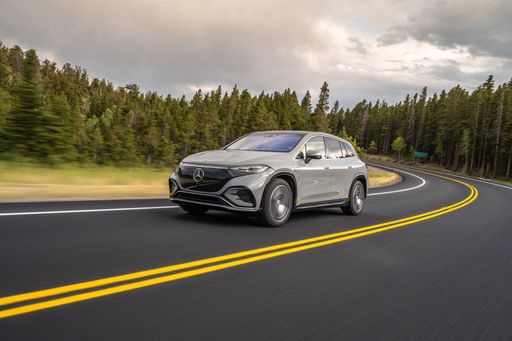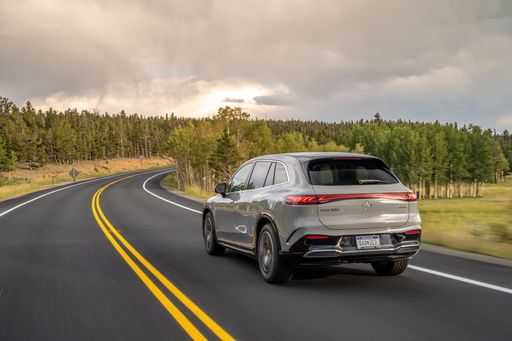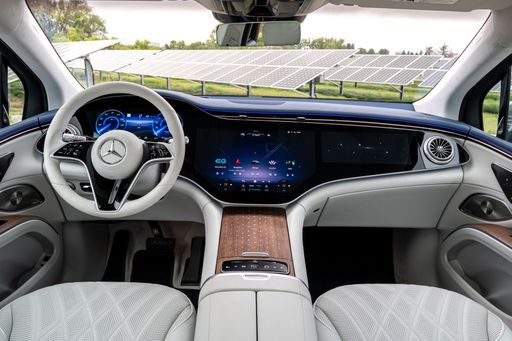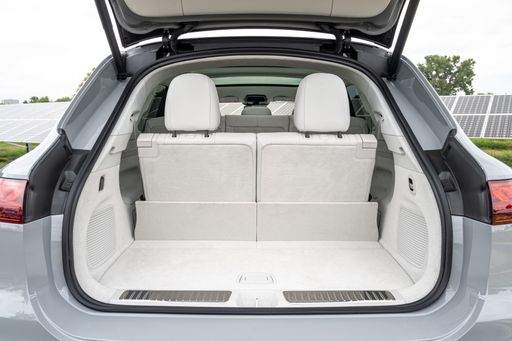Hyundai Tucson vs Mercedes EQS SUV - Differences and prices compared
Compare performance (288 HP vs 658 HP), boot space and price (20900 £ vs 95000 £ ) at a glance. Find out which car is the better choice for you – Hyundai Tucson or Mercedes EQS SUV?
Costs and Efficiency:
Price and efficiency are key factors when choosing a car – and this is often where the real differences emerge.
Hyundai Tucson has a decisively advantage in terms of price – it starts at 20900 £ , while the Mercedes EQS SUV costs 95000 £ . That’s a price difference of around 74075 £.
As for electric range, the Mercedes EQS SUV performs significantly better – achieving up to 695 km, about 625 km more than the Hyundai Tucson.
Engine and Performance:
Power, torque and acceleration say a lot about how a car feels on the road. This is where you see which model delivers more driving dynamics.
When it comes to engine power, the Mercedes EQS SUV has a significantly edge – offering 658 HP compared to 288 HP. That’s roughly 370 HP more horsepower.
In acceleration from 0 to 100 km/h, the Mercedes EQS SUV is convincingly quicker – completing the sprint in 4.40 s, while the Hyundai Tucson takes 7.50 s. That’s about 3.10 s faster.
In terms of top speed, the Mercedes EQS SUV performs barely noticeable better – reaching 210 km/h, while the Hyundai Tucson tops out at 204 km/h. The difference is around 6 km/h.
There’s also a difference in torque: Mercedes EQS SUV pulls convincingly stronger with 950 Nm compared to 379 Nm. That’s about 571 Nm difference.
Space and Everyday Use:
Whether family car or daily driver – which one offers more room, flexibility and comfort?
Both vehicles offer seating for 5 people.
In curb weight, Hyundai Tucson is convincingly lighter – 1542 kg compared to 2695 kg. The difference is around 1153 kg.
In terms of boot space, the Mercedes EQS SUV offers barely noticeable more room – 645 L compared to 620 L. That’s a difference of about 25 L.
In maximum load capacity, the Mercedes EQS SUV performs slightly better – up to 2100 L, which is about 301 L more than the Hyundai Tucson.
When it comes to payload, Mercedes EQS SUV hardly perceptible takes the win – 570 kg compared to 545 kg. That’s a difference of about 25 kg.
Who wins the race in the data check?
The Mercedes EQS SUV comes out modestly ahead in the objective data comparison.
This result only shows which model scores more points on paper – not which of the two cars feels right for you.
Costs and Consumption
View detailed analysis
Engine and Performance
View detailed analysis
Dimensions and Body
View detailed analysis

Mercedes EQS SUV
Hyundai Tucson
Hyundai Tucson marries bold, sculpted looks with a clever, roomy cabin that feels smarter than its price tag suggests. It's composed on the road, easy to live with day-to-day, and a sensible choice for buyers who want SUV style without the showroom theatrics.
details




Mercedes EQS SUV
The Mercedes EQS SUV blends limousine-level quiet and luxury with the commanding presence of an SUV, wrapping passengers in sumptuous materials and a futuristic, screen-dominated cabin. It drives with serene confidence and delivers the kind of effortless refinement that makes city commutes and long trips feel like first-class experiences — just be prepared for attention wherever you park it.
details



Costs and Consumption |
|
|---|---|
|
Price
20900 - 47900 £
|
Price
95000 - 212100 £
|
|
Consumption L/100km
2.7 - 7.6 L
|
Consumption L/100km
-
|
|
Consumption kWh/100km
-
|
Consumption kWh/100km
19.6 - 21.9 kWh
|
|
Electric Range
63 - 70 km
|
Electric Range
615 - 695 km
|
|
Battery Capacity
-
|
Battery Capacity
108.4 - 118 kWh
|
|
co2
62 - 172 g/km
|
co2
0 g/km
|
|
Fuel tank capacity
52 - 54 L
|
Fuel tank capacity
-
|
Dimensions and Body |
|
|---|---|
|
Body Type
SUV
|
Body Type
SUV
|
|
Seats
5
|
Seats
4 - 5
|
|
Doors
5
|
Doors
5
|
|
Curb weight
1542 - 1893 kg
|
Curb weight
2695 - 3075 kg
|
|
Trunk capacity
546 - 620 L
|
Trunk capacity
440 - 645 L
|
|
Length
4525 - 4535 mm
|
Length
5125 mm
|
|
Width
1865 mm
|
Width
1959 - 2034 mm
|
|
Height
1650 mm
|
Height
1718 - 1721 mm
|
|
Max trunk capacity
1795 - 1799 L
|
Max trunk capacity
2100 L
|
|
Payload
518 - 545 kg
|
Payload
425 - 570 kg
|
Engine and Performance |
|
|---|---|
|
Engine Type
Petrol, Full Hybrid, Plugin Hybrid, Diesel MHEV
|
Engine Type
Electric
|
|
Transmission
Manuel, Automatic
|
Transmission
Automatic
|
|
Transmission Detail
Manual Gearbox, Dual-Clutch Automatic, Automatic Gearbox
|
Transmission Detail
Reduction Gearbox
|
|
Drive Type
Front-Wheel Drive, All-Wheel Drive
|
Drive Type
All-Wheel Drive, Rear-Wheel Drive
|
|
Power HP
136 - 288 HP
|
Power HP
360 - 658 HP
|
|
Acceleration 0-100km/h
7.5 - 11.6 s
|
Acceleration 0-100km/h
4.4 - 6.8 s
|
|
Max Speed
196 - 204 km/h
|
Max Speed
210 km/h
|
|
Torque
250 - 379 Nm
|
Torque
568 - 950 Nm
|
|
Number of Cylinders
4
|
Number of Cylinders
-
|
|
Power kW
100 - 212 kW
|
Power kW
265 - 484 kW
|
|
Engine capacity
1598 cm3
|
Engine capacity
-
|
General |
|
|---|---|
|
Model Year
2025
|
Model Year
2024
|
|
CO2 Efficiency Class
F, D, E, B
|
CO2 Efficiency Class
A
|
|
Brand
Hyundai
|
Brand
Mercedes-Benz
|
What drive types are available for the Hyundai Tucson?
Available configurations include Front-Wheel Drive or All-Wheel Drive.




